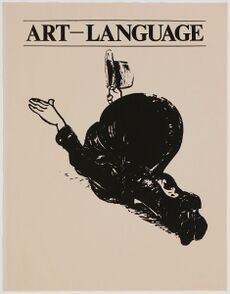Louis Napoleon

Lyrics
(To) forsake your Italian For a German Who shouts (iconically) Is creativity And art history
Half the former Fatherland Is the spiritual homeland Of the International Proletariat — Which must Accept the aesthetic apparat Of bundes republican fat
A social project is a commodity Conditioned by the obvious nobility Of a geriatric Luftwaffe reject Autoiconographic Door to door Wall to wall … Nobody
It takes a careless singer To provide a nonentity With the identity And the last claim to territory Of a teacher To fools and heroes
Desert your Italian For a German: Someone wants to help you learn The interdisciplinary Publicity Of complimentary (sic) Cultural creati-creativity
Chronology
 Corrected Slogans
Corrected Slogans - ? (woman) - vocals
- ? (man) - vocals
- Mayo Thompson - vocals, piano
- Michael Baldwin(?) - vocals
- ? (man) - vocals
Retrospectives
Michael Baldwin, 2006[1]
[...] le mythique plasticien Joseph Beuys est traité de "rejet gériatrique de la Luftwaffe". "C'est vrai, c'est un fasciste", tient à souligner l'artiste britannique. [...]
Interpretations
The song is about the German artist Joseph Beuys. He is also caricatured on the cover of Corrected Slogans. Beuys volunteered for the Luftwaffe, Nazi Germany's air force, in 1941. His plane crashed in 1944. After the war he became an artist.
Art & Language UK, The Fox 3 (May 1976)
(How about Joseph Beuys’ solution to Ulster’s troubles: set up free schools where the proletariat can be distracted by the realisation of their own true creativity? What does he think they’re going to do? Sculpting in fat and felt and talking to dead animals don’t map easily onto the culture of the Six Counties.)
A quote attributed to Beuys appears in "Above Us the Waves (A Fascist Index)" in Art-Language Vol. 3 No. 4 (October 1976): "'There's always someone worse off than yourself', I always say". This may be a reference to an exchange in the sitcom Fawlty Towers (1975): "Just remember, Mr. Fawlty, there's always someone worse off than yourself." "Is there? Well, I'd like to meet him. I could do with a laugh."
Charles Harrison contrasts Art & Language's Indexing project with Joseph Beuys' work briefly in Essays on Art & Language
In the Modern Movement of the 1930s the artist was proposed as the type of the ideal planner. In the utopian artistic culture of the later 1960s and early 1970s (and in the careers of such figures as Joseph Beuys), the individual creative activity of the artist was often proposed as the ideal model of all productive activity. Such notions tend to depart from an aesthetic conviction of the meaninglessness of other lives.[2]
[...] In reviewing various installations at 'Documenta 5', [Carter] Ratcliff dismissed the Art & Language Index as 'an unusable demonstration of "good office design"' and related it to the office established at 'Documenta' by Joseph Beuys, the purpose of which was the dissemination of his own aesthetic-political proposals.[3]
Another ALUK article in The Fox 3 also uses the phrase "aesthetic apparat".